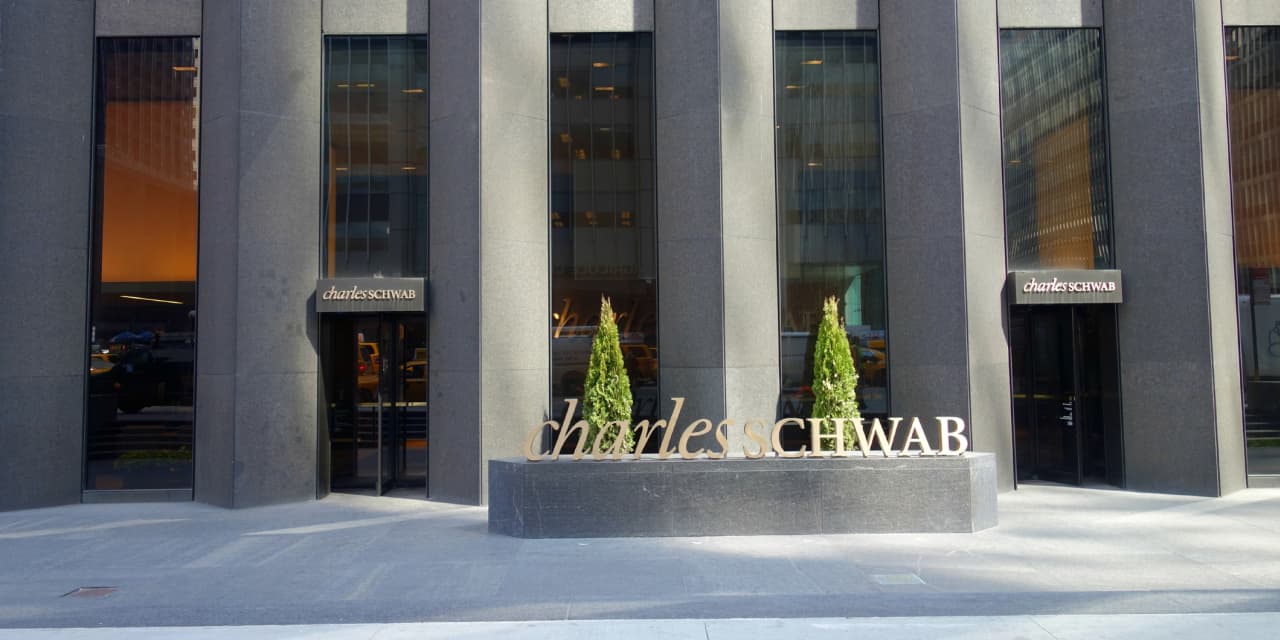Charles Schwab
reported better-than-expected fourth-quarter earnings on Tuesday, but investors sold the company’s stock as uncertainty about Schwab’s future performance appeared to overshadow the earnings beat.
Shares plunged as much as 7% at the start of Tuesday’s session, but recovered ground throughout the day. They closed down 1.3% while the S&P 500 ended the day down 0.6%.
Schwab’s net income fell to $1 billion from $2 billion for the same period a year earlier, and adjusted earnings per share fell to 68 cents from $1.07. Rising interest and noninterest expenses hurt the company’s bottom line.
EPS was still ahead of Wall Street analysts’ estimate of 64 cents. Schwab’s revenue was slightly lower than analysts’ expectation for $4.5 billion, decreasing to $4.45 billion from $5.5 billion a year earlier.
The company’s stock was battered in 2023 on concerns about outflows of money from sweep accounts at Schwab’s bank and related increases in expenses. The company laid off approximately 2,000 employees as a cost-cutting measure late last year.
“It was perhaps the most challenging [year] in my time at Schwab,” CEO Walt Bettinger said on a post earnings conference call. “Certainly the most challenging since the internet bubble.”
During the call, executives said the headwinds Schwab has faced are temporary and easing, but they added that the company’s near-term financial performance will be shaped by factors that are difficult to predict, such as the trajectory of interest rates and client behavior. Schwab executives also said net interest margin could reach a range of 2.25% to 2.65% by the end of 2023. That’s down from a previous outlook of 2.70%, analysts at Jefferies said in note Tuesday morning. Schwab reiterated that the company can hit 3.00% by 2025.
Schwab also reported that while short-term borrowings fell, long-term debt rose 25% year over year to $26.1 billion. That’s up 5% from the previous quarter. William Blair analyst Jeff Schmitt says that was a surprise, and a likely factor in why the stock dropped in early trading. “That to me is the main concern,” he says.
Schmitt rates Schwab outperform and says there were otherwise positive signs in the company’s fourth-quarter earnings report, such as increases in cash deposits and organic growth.
Schwab’s troubles last year stemmed from rising interest rates, which prompted clients to move billions in uninvested cash from low-paying bank sweep accounts to higher-yielding options. Though the money doesn’t leave Schwab, the process, known as cash sorting, has put pressure on earnings, because Schwab earns more on the sweep accounts than the other options. When deposit outflows have exceeded Schwab’s cash on hand, it has had to rely on expensive short-term borrowings to plug the gap.
Net interest revenue for 2023 dropped to $9.4 billion from $10.7 billion for 2022 because of soaring interest expenses.
“Schwab’s financial performance during 2023 reflected the challenges of navigating a market environment shaped by the Federal Reserve’s pronounced interest-rate tightening policy and the follow-on effects stemming from the regional banking crisis in March,” Schwab CFO Peter Crawford said in a statement.
There are signs that cash sorting is abating, which should relieve pressure on Schwab. The company had $290 billion in bank deposits for the fourth quarter. That’s down 21% from the fourth quarter of 2022, but up 2% from the third quarter of 2023. And Federal Home Loan Bank borrowings—one of Schwab’s tools for coping with deposit outflows—fell to $26.4 billion, down 17% from the third quarter.
“We are endeavoring to pay those off as quickly as possible,” Crawford said during the company’s earnings call.
The company also continues to rake in new client money. Schwab reported $43 billion in core net new assets in December alone, and $306 billion for 2023. Total client assets reached a record $8.5 trillion at the end of 2023, up 21% compared with 2022.
Charles Schwab operates one of the nation’s largest online brokerages. It’s also the largest custodian of assets for registered investment advisory firms.
The net new asset figure for December was likely a welcome sign for investors as Schwab had suffered some customer attrition in late 2023 due to the integration of TD Ameritrade, which Schwab acquired at the end of 2020. Now that 90% of Ameritrade customers have moved to Schwab’s platform, much of that attrition is likely behind the company.
Schwab’s fourth-quarter results were negatively affected by a $172 million special assessment by The Federal Deposit Insurance Corporation, which the agency is also imposing on other banks after last year’s regional bank crisis.
During the company’s earnings call, Bettinger acknowledged that last year’s challenges “don’t disappear just because the calendar flips over.” But, he said, the firm is turning a corner and sticking with what he characterized as a proven business model.
“2024 is going to be a transition year from a financial standpoint, albeit one with steadily improving financial results throughout the year and a strong exit into 2025,” he said.
Write to Andrew Welsch at [email protected]
Read the full article here




